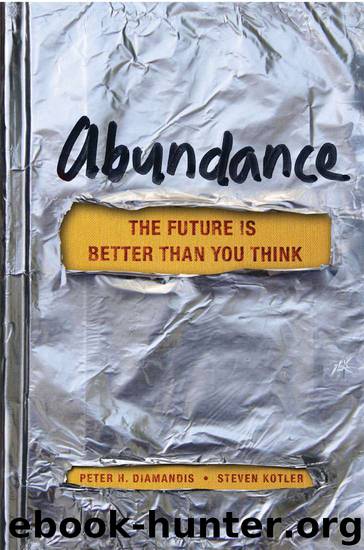Abundance by Steven Kotler & Peter H. Diamandis

Author:Steven Kotler & Peter H. Diamandis [Kotler, Steven]
Language: eng
Format: mobi
Publisher: Simon & Schuster, Inc.
Published: 2012-02-21T05:00:00+00:00
James Gee Meets Pajama Sam
About ten years ago, Dr. James Gee sat down to play Pajama Sam for the first time. Gee is a linguist at Arizona State University. His early work examined syntactic theory, his more recent research delves into discursive analysis. Pajama Sam falls into neither of those categories. It’s a problem-solving video game aimed at young children. But Gee had a six-year-old son, and he wanted to help him develop better problem-solving skills.
The game surprised Gee. The problems, as it turned out, were a little harder than expected. More stunning was how well the game held his son’s attention. This piqued Gee’s curiosity. He started to wonder about adult video games, so he picked up a copy of The New Adventures of the Time Machine—mostly because he liked the H. G. Wells reference in the title. “When I sat down to play, it wasn’t anything like I expected,” he recalls. “I had this idea that video games were relaxing, like television is relaxing. Time Machine was hard, long, and complex. All of my normal ways of thinking didn’t apply. I had to relearn how to learn. I couldn’t believe people would pay fifty bucks to be this frustrated.”
But then it clicked: lots of young people were paying lots of money to engage in activities this frustrating. “As an educator, I realized this was the same problem our schools face: how do you get students to learn things that are long, hard, and complex?” Gee became intrigued by the implications. He also became intrigued by the games. Gee may be the only linguist in the world whose recent academic research includes the phrase: “The Legend of Zelda: The Windwalker,” but that research has helped turn upside down much of what people believed about video games.
For example, the idea that games are a waste of time holds up only if you consider serious, deep learning a waste of time. “Take young kids playing Pokémon,” says Gee. “Pokémon is a game for five-year-olds, but it requires a lot of reading to play. And the text isn’t written for five-year-olds, it’s written at about a twelfth-grade level. In the beginning, Mom has to play with her child, reading the text aloud. This is great, of course, because this is just how kids learn to read—by reading aloud with their parents. But then something funny happens. The kid realizes that Mom might be good at reading, but she’s not very good at playing. So the kid starts reading, just so he can kick Mom out of the game and play with his friends.”
This is just the beginning. Studies have shown that games outperform textbooks in helping students learn fact-based subjects such as geography, history, physics, and anatomy, while also improving visual coordination, cognitive speed, and manual dexterity. For example, surgeons and pilots trained on video games perform better than those who were not. But the real advantage is an ability to do what today’s schools cannot: teach twenty-first-century skills. World-building games like SimCity and RollerCoaster Tycoon develop planning skills and strategic thinking.
Download
This site does not store any files on its server. We only index and link to content provided by other sites. Please contact the content providers to delete copyright contents if any and email us, we'll remove relevant links or contents immediately.
| Anthropology | Archaeology |
| Philosophy | Politics & Government |
| Social Sciences | Sociology |
| Women's Studies |
Cecilia; Or, Memoirs of an Heiress — Volume 1 by Fanny Burney(32544)
Cecilia; Or, Memoirs of an Heiress — Volume 2 by Fanny Burney(31940)
Cecilia; Or, Memoirs of an Heiress — Volume 3 by Fanny Burney(31928)
The Great Music City by Andrea Baker(31915)
We're Going to Need More Wine by Gabrielle Union(19033)
All the Missing Girls by Megan Miranda(15942)
Pimp by Iceberg Slim(14481)
Bombshells: Glamour Girls of a Lifetime by Sullivan Steve(14050)
For the Love of Europe by Rick Steves(13891)
Talking to Strangers by Malcolm Gladwell(13344)
Norse Mythology by Gaiman Neil(13343)
Fifty Shades Freed by E L James(13231)
Mindhunter: Inside the FBI's Elite Serial Crime Unit by John E. Douglas & Mark Olshaker(9317)
Crazy Rich Asians by Kevin Kwan(9275)
The Lost Art of Listening by Michael P. Nichols(7488)
Enlightenment Now: The Case for Reason, Science, Humanism, and Progress by Steven Pinker(7306)
The Four Agreements by Don Miguel Ruiz(6744)
Bad Blood by John Carreyrou(6610)
Weapons of Math Destruction by Cathy O'Neil(6263)
